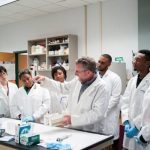 How science is reported is vitally important for the public appreciation of scientific issues, especially in an era where fake news appears to be flourishing. A recent report from the University of Pennsylvania Annenberg Public Policy Center explores how science is communicated, and finds that most news coverage of scientific findings portray them as a quest for discovery.
How science is reported is vitally important for the public appreciation of scientific issues, especially in an era where fake news appears to be flourishing. A recent report from the University of Pennsylvania Annenberg Public Policy Center explores how science is communicated, and finds that most news coverage of scientific findings portray them as a quest for discovery.
It reveals that most coverage of science portrays the journey the research has undertaken to ultimately produce the breakthrough. The stories are littered with words like ‘discovery’ and ‘breakthrough’. They’re much less likely to report on the various false starts or dead ends that are a crucial part of scientific progress.
The report aims to discover how the news media cover the scientific process. They do so by analyzing the coverage of a number of widely reporting scientific findings over the past few years, from 2015 to 2017. The period saw 281 stories in total, covering 165 research papers.
46% of these stories characterized the study they reported on a discovery, with 49% also highlighting the next steps for the project. Only 4% described any kind of false starts or mistakes however, despite the vast majority highlighting the process the research went through.
“Because media shape our perceptions, the scientific community needs to understand the storylines characterizing news accounts both about consequential research and about the scientific community’s responses to concerns about such matters as failures to replicate consequential findings and the rise in the rate of retractions,” the authors say.
The report is part of an ongoing body of work that aims to examine how science is reported in the media. The team plan to cover areas such as coverage of controversial science and scientific retractions in future work.
This work has already begun with an article published in the Proceedings of the National Academy of Sciences, where they outline the importance of communicating science accurately, warts and all.
“[D]efective narratives can enhance the capacity of partisans to discredit areas of science—including genetic engineering, vaccination, and climate change—containing findings that are ideologically uncongenial to them,” they say. “In contrast, accurate narratives can increase public understanding not only of the nature of the discovery process, but also of the inevitability of false starts and occasional fraud.”